Chamba is an ancient town in the Chamba district in the state of Himachal Pradesh, in northern India. According to the 2001 Indian census, Chamba has a population of 38,312 people. Located at an altitude of 996 metres (3,268 ft) above mean sea level, the town is situated on the banks of the Ravi River (a major tributary of the Trans-Himalayan Indus River), at its confluence with the Sal River.
Though historical records date the history of the Chamba region to the Kolian tribes in the 2nd century BC, the area was formally ruled by the Maru dynasty, starting with the Raju Maru from around 500 AD, ruling from the ancient capital of Bharmour, which is located 75 kilometres (47 mi) from the town of Chamba. In 920, Raja Sahil Varman (or Raja Sahil Verma) shifted the capital of the kingdom to Chamba, following the specific request of his daughter Champavati (Chamba was named after her). From the time of Raju Maru, 67 Rajas of this dynasty have ruled over Chamba until it finally merged with the Indian Union in April 1948, although Chamba was under British suzerainty from 1846 to this time.
The town has a large number of temples and palaces, and hosts two popular jatras (fairs), the "Suhi Mata Mela" and the "Minjar Mela", which last for several days and involve music and dancing. Chamba is also well noted for its arts and crafts, particularly its Pahari paintings, which originated in the Hill Kingdoms of North India between the 17th and 19th century and its handicrafts and textiles.
Chamba is the headquarters of the Chamba district, bordered by Jammu and Kashmir to the north-west and west, the Ladakh area of Jammu and Kashmir and Lahaul and Bara Banghal to the north-east and east, Kangra to the south-east and Gurdaspur district of Punjab to the south. It has an average elevation of 1,006 metres (3,301 ft).
The town, the district and the valley where the town is located, share the name of Chamba. The town of Chamba is located at the junction of Ravi River and its tributary, the Sal River, with the Shah Madar hill forming the backdrop on its eastern side. The Ravi flows in east-west direction forming deep canyons. During the spring and summer months, the levels of the river rise significantly from snow melt and pose a flooding risk. Record levels were experienced in early July 2005, when the National Hydroelectric Power Corporation was forced to shut down the power generation on its 300-MW Chamera Power Station.
The temperatures in summer vary between 38 °C (100 °F) and 15 °C (59 °F) and in winter: 15 °C (59 °F) and 0 °C (32 °F). The maximum temperature recorded in summer is 39 °C (102 °F) and the minimum temperature in winter is -1 °C (30.2 °F). Climatically March to June is said to be the best period to visit Chamba, which is a well known hill station. The average annual rainfall in the town is 785.84 millimetres (30.939 in).
By Road: Located on the right bank of the Ravi river valley, built on successive flat terraces, the town is bounded topographically by the Dhauladhar and Zanskar ranges, south of the inner Himalayas. Chamba, despite its hill location, is well connected by road to the rest of the state and country, including Shimla, Delhi and Chandigarh along several routes.
By Rail: The nearest broad gauge railway stations are at Chakki Bank and Pathankot, the latter of which is 120 kilometres (75 mi) away by road.
By Air: The nearest airprot from Chamba is at Gaggal in Kangra valley 180 km.
Classic Hill Top Resort
Royal Residency
Hotel Aroma Palace
Akhand Chandi Hotel
Though historical records date the history of the Chamba region to the Kolian tribes in the 2nd century BC, the area was formally ruled by the Maru dynasty, starting with the Raju Maru from around 500 AD, ruling from the ancient capital of Bharmour, which is located 75 kilometres (47 mi) from the town of Chamba. In 920, Raja Sahil Varman (or Raja Sahil Verma) shifted the capital of the kingdom to Chamba, following the specific request of his daughter Champavati (Chamba was named after her). From the time of Raju Maru, 67 Rajas of this dynasty have ruled over Chamba until it finally merged with the Indian Union in April 1948, although Chamba was under British suzerainty from 1846 to this time.
The town has a large number of temples and palaces, and hosts two popular jatras (fairs), the "Suhi Mata Mela" and the "Minjar Mela", which last for several days and involve music and dancing. Chamba is also well noted for its arts and crafts, particularly its Pahari paintings, which originated in the Hill Kingdoms of North India between the 17th and 19th century and its handicrafts and textiles.
Chamba is the headquarters of the Chamba district, bordered by Jammu and Kashmir to the north-west and west, the Ladakh area of Jammu and Kashmir and Lahaul and Bara Banghal to the north-east and east, Kangra to the south-east and Gurdaspur district of Punjab to the south. It has an average elevation of 1,006 metres (3,301 ft).
The town, the district and the valley where the town is located, share the name of Chamba. The town of Chamba is located at the junction of Ravi River and its tributary, the Sal River, with the Shah Madar hill forming the backdrop on its eastern side. The Ravi flows in east-west direction forming deep canyons. During the spring and summer months, the levels of the river rise significantly from snow melt and pose a flooding risk. Record levels were experienced in early July 2005, when the National Hydroelectric Power Corporation was forced to shut down the power generation on its 300-MW Chamera Power Station.
The temperatures in summer vary between 38 °C (100 °F) and 15 °C (59 °F) and in winter: 15 °C (59 °F) and 0 °C (32 °F). The maximum temperature recorded in summer is 39 °C (102 °F) and the minimum temperature in winter is -1 °C (30.2 °F). Climatically March to June is said to be the best period to visit Chamba, which is a well known hill station. The average annual rainfall in the town is 785.84 millimetres (30.939 in).
How to Reach Chamba
By Road: Located on the right bank of the Ravi river valley, built on successive flat terraces, the town is bounded topographically by the Dhauladhar and Zanskar ranges, south of the inner Himalayas. Chamba, despite its hill location, is well connected by road to the rest of the state and country, including Shimla, Delhi and Chandigarh along several routes.
By Rail: The nearest broad gauge railway stations are at Chakki Bank and Pathankot, the latter of which is 120 kilometres (75 mi) away by road.
By Air: The nearest airprot from Chamba is at Gaggal in Kangra valley 180 km.
Places to Visit in Chamba
Champavati Temple
This temple was built by Raja Sahil Varman in memory of his daughter Champavati. The temple, located near the Police Post and the Treasury building, is built in the Shikhara style, with intricate stone carvings. It has a wheel roof and is large as the Laxmi Narayan Temple. An idol of the goddess Mahishasuramardini (Durga) is worshipped in the temple. The walls of the temple are full of exquisite stone sculptures. On account of its historical and archeological importance, the temple is maintained by the Archeological Survey of India.Lakshmi Narayan Temple
The Lakshmi Narayan temples complex, devoted to the Vaishnavite sect, includes the main Lakshmi Narayan temple, built in the 10th century by Raja Sahil Verman. It has been built to suit the local climatic conditions with wooden chatries and has a shikara, and a sanctum sanctorum (Garbhagriha), with an antarala and a mantapa. A metallic image of Garuda, the vahana (mount) of Vishnu is installed on the dwajastamba pillar at the main gate of the temple. In 1678, Raja Chhatra Singh adorned the temple roof with gold plated pinnacles, as a riposte to Auranagzeb, who had ordered demolition of this temple.Chamunda Devi Temple
Chamunda Devi Temple is located in a prominent position on the spur of Shah Madar range of hills, opposite to the Chamba town. It was built by Raja Umed Singh, and was completed in 1762. It is the only wooden temple with gabled roof (single storied) in Chamba, while all others in the town are built from stone in the north Indian Nagara architectural style.Akhand Chandi Palace
The Akhand Chandi Palace, noted for its distinct green roof, was built by Raja Umed Singh between 1747 and 1765 and used as his residence. Later, Raja Sham Singh refurbished it with the assistance of British engineers. In 1879, the Darbar Hall (also named 'Marshal Hall' after the builder) was built. Raja Bhuri Singh added the Zenana Mahal (residence of Royal ladies). The building was exemplary of the fusion of Mughal and British architectural influences. In 1958, the Royal family of Chamba sold the palace to the Government of Himachal Pradesh, who in turn converted it in to a Government College and District Library. Maintenance of the attractive palace, however, which has painted walls and glass work and intricate woodwork, has not been satisfactory, due to the lack of funds allocated to refurbish it. The palace provides scenic views of the Chaugan, Laxmi Narayana Temple, Sui Mata, Chamunda Devi Temple, Rang Mehal, Hari Rai Temple and Bansi Gopal Temple.Chamba Weather:
Hotels in Chamba
Classic Hill Top Resort
Royal Residency
Hotel Aroma Palace
Akhand Chandi Hotel
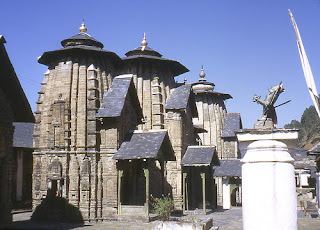

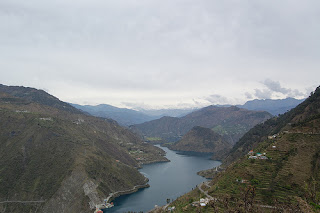
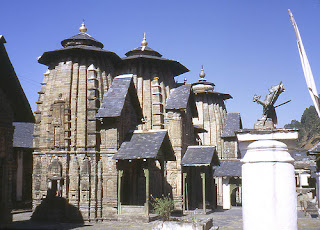
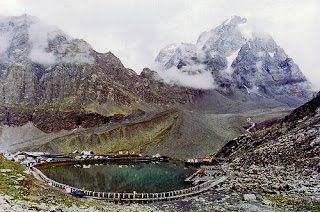
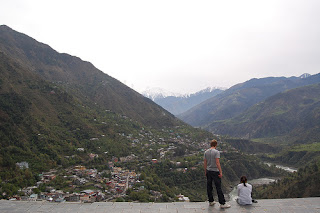
No comments:
Post a Comment